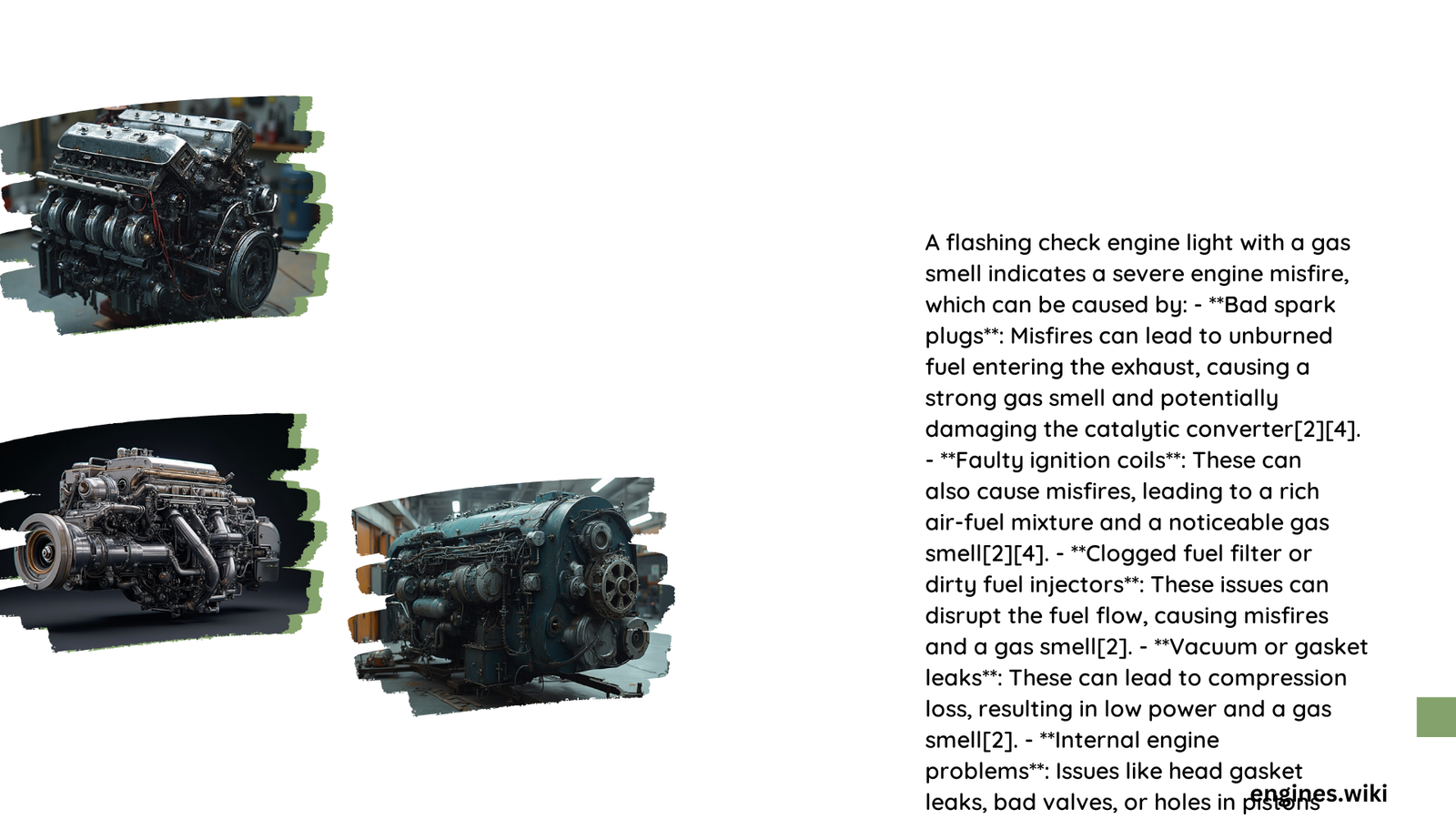A flashing check engine light accompanied by a gas smell is a serious warning sign that requires immediate attention. This combination typically indicates an engine misfire, which can lead to catalytic converter damage and expensive repairs if left unaddressed. The gas smell suggests unburned fuel is entering the exhaust system, potentially due to issues in the fuel or ignition systems. Understanding the causes, symptoms, and solutions is crucial for maintaining your vehicle’s health and safety.
What Are the Main Causes of a Flashing Check Engine Light with Gas Smell?
The primary causes of this alarming combination include:
- Ignition System Problems:
- Faulty spark plugs
- Damaged ignition coils
-
Worn ignition wires
-
Fuel System Issues:
- Malfunctioning fuel injectors
- Clogged fuel filter
-
Fuel pressure regulator failure
-
Vacuum or Gasket Leaks:
- Cracked vacuum lines
-
Damaged intake manifold gasket
-
Oxygen Sensor Malfunction:
- Faulty O2 sensors affecting air-fuel mixture
What Symptoms Accompany a Flashing Check Engine Light and Gas Odor?

When experiencing a flashing check engine light and gas smell, you may notice:
- Strong gasoline odor inside or outside the vehicle
- Engine misfires or rough running
- Decreased fuel efficiency
- Loss of power during acceleration
- Visible smoke from the exhaust
- Jerky or inconsistent acceleration
- Vehicle shaking or vibrating, especially at idle
How Can You Diagnose the Problem?
To diagnose the issue causing the flashing check engine light and gas smell:
- Use an OBD-II scanner to retrieve diagnostic trouble codes (DTCs)
- Perform a visual inspection of the engine bay
- Conduct a fuel pressure test
- Check for vacuum leaks using a smoke machine
- Test the ignition system components
- Perform a compression test on all cylinders
What Are the Potential Repair Costs?
The repair costs can vary widely depending on the root cause:
| Issue | Estimated Cost Range |
|---|---|
| Spark Plug Replacement | $50 – $200 |
| Ignition Coil Replacement | $150 – $400 per coil |
| Fuel Injector Cleaning/Replacement | $200 – $1,500 |
| Oxygen Sensor Replacement | $200 – $500 |
| Vacuum Leak Repair | $100 – $500 |
| Intake Manifold Gasket Replacement | $300 – $900 |
Is It Safe to Drive with a Flashing Check Engine Light and Gas Smell?
No, it is not safe to continue driving when experiencing a flashing check engine light and gas smell. This combination indicates a severe problem that could lead to:
- Catalytic converter damage
- Engine damage
- Increased risk of fire
- Potential loss of vehicle control
Pull over to a safe location as soon as possible and have the vehicle towed to a reputable mechanic for inspection and repair.
How Can You Prevent This Issue in the Future?
To minimize the risk of encountering a flashing check engine light and gas smell:
- Follow your vehicle’s recommended maintenance schedule
- Use high-quality fuel and keep the fuel system clean
- Replace spark plugs at recommended intervals
- Address any check engine light promptly, even if not flashing
- Have regular inspections of your vehicle’s fuel and ignition systems
- Pay attention to any changes in your vehicle’s performance or smell
What Should You Do Immediately When You Notice This Problem?
If you experience a flashing check engine light and gas smell:
- Safely pull over and turn off the engine
- Do not attempt to restart the vehicle
- Call for a tow truck to transport your vehicle to a repair shop
- Inform the mechanic of the specific symptoms you observed
- Provide any diagnostic codes retrieved from an OBD-II scanner
By taking swift action and seeking professional help, you can prevent further damage to your vehicle and ensure a safe resolution to this serious issue.
